#159 | This ruined house
Kavala, Greece
The following thousand year-old poem tells the truth. Before we begin, let’s read it together — slowly, perhaps aloud —
Although the wind
blows terribly here,
the moonlight also leaks
between the roof planks
of this ruined house.
I enter Turkey today and prepare to leave Europe after nine weeks. On the 10th I fly to Egypt, and will continue cycling from Luxor. Nine weeks: I’m sure I’ve never before committed to nine weeks of anything. Nine weeks of no caffeine? nope; of no sugar? no; of meditating daily? also no (imagine if I had). However, weeks and weeks of rolling around on a bicycle, through rain (it rained like hell today) and over hills, seems positively easy. Relatatedly, I have learned a lesson from the zig-zag across Europe.
Cycling is easy because it is a positive, forward, action — rather than an un-action. It’s not disavowing a need, but leaning into an adventure. It’s not giving something up, but taking it on. This contrasts to our culture of cessation — of quitting.
In our ‘Quit’ culture life is a work of omission. You’re often doing the wrong thing: you’re too fat, your cholesterol is too high, you’re too distracted, too addicted, too obsessed with the news, not focussed on your family, not successful enough, too busy or suffering from loneliness, et cetera. The zeitgeist is ever-critical, and the criticism is infectious.
Criticism, of course, sells. There is a diet and a pill for it, an app to build your focus, a course to flee refined sugar, a camp to chase-off white carbs, The Economist to inform you and The Holiday to numb you, an iPad to appease your child, American Express — Gold — to make you successful, Bumble to meet friends. Each has a cost, and too often we judge ourselves by the quantiy, if not the value, of the inteventiones we undergo to fix us.
Let’s stop fixing ourselves. Many of my friends — including you? (and me, frankly) — need to be reminded how exceptional and beautiful and special they are. We don’t need to fix anything: our hairline is exactly where it should be, our breasts hover in the right places, our posture is just right, and our eyesight — fine. Let’s stand out in the rain of reality let all that expensive makeup wash down our faces, and return to the poem:
Although the wind
blows terribly here,
the moonlight also leaks
between the roof planks
of this ruined house.
If it were not for the ruin of the house — the holes in the roof and the floor and the walls — we would not see the moonlight. If we were to dishonestly patch it up, shut out the wind, brick up all the colour of life, we’d miss out on what makes it worth it: the glinting moonlight.
I recently sat with a retired British couple on the coast east of Thessaloniki. The campsite cost 8 euros, and for that price the proprietor turned off the lights at 8 pm. I sat in the dark, glowing from my screen, lit-fingers tapping.
The couple, Sharon and, ah — I didn’t catch his name — were driving by motor home from Turkey. On the first day of the first lockdowns, Sharon slipped down some stone stairs and broke her heel. The hospital, being under pressure, couldn’t help her fully, and her foot healed badly in a cast.
Today she can only walk for 200 yards at a time and is often on crutches or in her wheelchair. She is in pain permanently. She tells me she wants her life back — to walk the dog.
Sensitivley, I share with them the message of the poem: where is the moonlight leaking into this terrible situation? First, she tells me if she hadn’t landed as she did, she would have fallen much further and perhaps died. Her recent visit to the stone steps confirmed it: her heel saved her life. Second, her and her husband's relationship has become stronger and tougher (he got early retirement). Even in this terrible moment, there is moonlight in the ruined house.
When cycling, those crushing uphills enable cruising down hills. The faults in our house let in the moonlight. Every coin has two sides. So let's stop fixing ourselves, and be happy that the wind is rushing in and that the floorboards rattle.
*
Live well,
Hector



